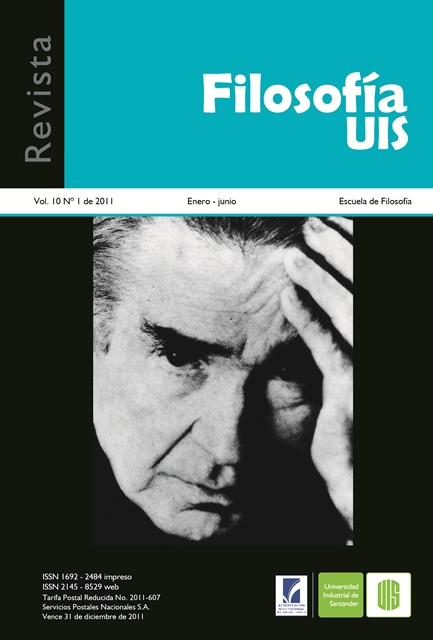Published 2011-07-15
Keywords
- humor,
- irony,
- laughter,
- morality,
- Schopenhauer
How to Cite
Copyright (c) 2011 Jorge Martin

This work is licensed under a Creative Commons Attribution 4.0 International License.
Abstract
At the end of the second chapter of Laughter, called “The comic element in situations and the comic element in words”, we find a strange paragraph where Bergson develops his idea of irony and humor, but does not mention illustrative examples. In this article, we explain Bergson’s thoughts about the procedure for obtaining the comic element in words. We search for literary examples that clarify his judgements on irony and humour. Finally, we compare his position to the ideas concerning this subject exposed by Schopenhauer in The World as Will and Representation.
Downloads
References
- Bergson, Henri (1972). Mélanges, Paris: Presses Universitaires de France.
- Bergson, Henri (1992). Cours II, Paris: Presses Universitaires de France.
- Bergson, Henri (2000). Cours IV, Paris: Presses Universitaires de France.
- Bergson, Henri (2007). Le rire, Paris: Presses Universitaires de France.
- Bergson, Henri (2008). Les deux sources de la morale et de la religion, Paris: Presses Universitaires de France.
- Escarpit, Robert (1972). El humor, Buenos Aires: Eudeba.
- Hegel, Georg (1977). Lecciones sobre la historia de la filosofía III, México: Fondo de Cultura Económica.
- Hobbes, Thomas (1994). Leviatán, Barcelona: Altaya.
- Jankélévitch, Vladimir (1936). L’ironie, Paris: Librairie Félix Alcan.
- Pirandello, Luigi (1994). El humorismo, Buenos Aires: Leviatán.
- Richter, Jean-Paul (1862). Poétique ou Introduction à l’esthétique, Paris: Auguste
- Durand.
- Schoentjes, Pierre (1999). “Ironie et théories du rire: l’enseignement de Schopenhauer et de Bergson”, En: Defays, Jean-Marc et al. (eds.), Approches du discourse comique, Hayen: Pierre Mardaga.
- Schoentjes, Pierre (2001). Poétique de l’ironie, Paris: Seuil.
- Schopenhauer, Arthur (2004). El mundo como voluntad y como representación I, Madrid: Trotta.
- Schopenhauer, Arthur (2005). El mundo como voluntad y como representación II, Madrid: Trotta.
- Sprigge, Timothy (1988). “Schopenhauer and Bergson on laughter”, En: Comparative Criticism, Vol. 10, pp. 39-65.
- Thackeray, William (1856). The book of snobs, London: Bradbury and Evans.
- Thackeray, William (1962). La feria de las vanidades, Barcelona: Ediciones Toray.
- Voltaire (1994). Cándido y otros cuentos, Barcelona: RBA.
- Worms, Frédéric (1994). “Le rire et sa relation au mot d’esprit. Notes sur la lectura de Bergson et de Freud”, En: Szafran, Willy et al (eds.), Freud et le rire, Paris: Metailié.
